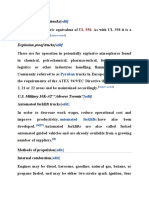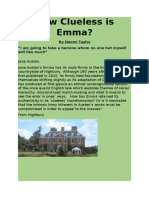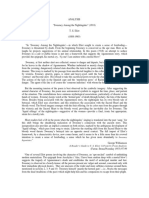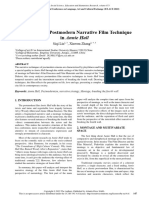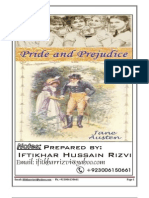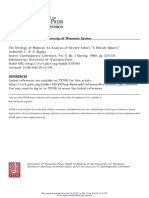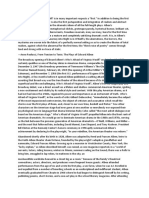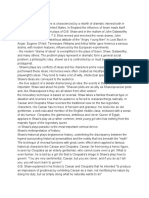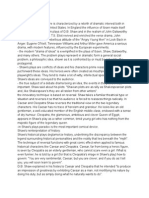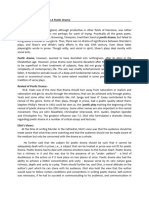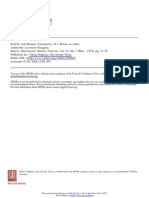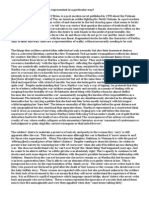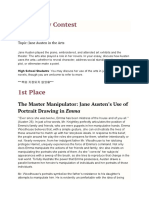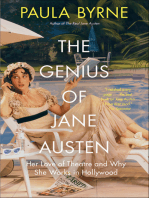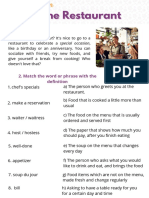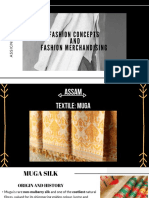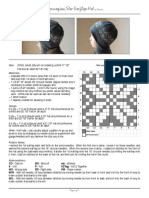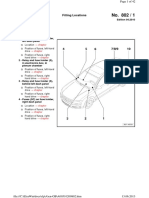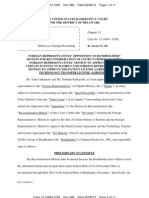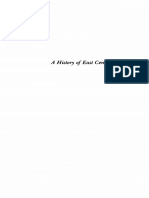Professional Documents
Culture Documents
Emma Becomes Clueless
Emma Becomes Clueless
Uploaded by
NathorlOriginal Description:
Copyright
Available Formats
Share this document
Did you find this document useful?
Is this content inappropriate?
Report this DocumentCopyright:
Available Formats
Emma Becomes Clueless
Emma Becomes Clueless
Uploaded by
NathorlCopyright:
Available Formats
Emma Becomes Clueless
Suzanne Feiiiss
An essay by Susan Feiiiss publisheu in }ane Austen in Bollywoou, eu. Linua Tioost
anu Sayie uieenfielu, The 0niveisity Piess of Kentucky, Kentucky, 1998.
Repiouuceu by kinu peimission of the publisheis. All quotations fiom this text
shoulu be cieuiteu to The 0niveisity Piess of Kentucky anu to the }ASA website.
Rankeu among the top ten enteitaineis by Enteitainment Weekly (AscheiWalsh),
}ane Austen is 'the posthumous queen of genteel cinema' (Naslin). Recent film
veisions of Emma invite speculation about the novel's appeal in the 199us. Wiitten
in 1816, Emma tiaces a classic comic aic: a misguiueu matchmakei, oveiconfiuent
in hei abilities, leains the eiioi of hei peiceptions anu uiscoveis love in the
piocess. As in othei Austen novels, the female piotagonist's success comes thiough
maiiiage, a cleai ieflection of the text's comic ioots anu also an inuication of its
essential conseivatism. Apait fiom the outspokenness of its piotagonist, the novel
beais few signs of the nascent feminism intiouuceu in Biitain by Naiy
Wollstoneciaft's A vinuication of the Rights of Women (1792), publisheu uecaues
eailiei. What accounts, then, foi the novel's cuiient vogue in the populai meuia.
Thiee cinematic veisions of Emma have appeaieu since 199S. Two of the thiee,
Bouglas Ncuiath's Emma, featuiing uwyneth Paltiow, anu Biaimuiu Lawience
anu Anuiew Bavies's Emma, with Kate Beckinsale, go to gieat lengths to evoke the
Regency peiiou. In the Neichant-Ivoiy school of filmmaking, they luie auuiences
with the tiauitional piomise of escape into a cinematic ieconstiuction of the past.
Plungeu into an oinately costumeu, socially stiatifieu society chaiacteiizeu by
lavish, but tasteful, uisplays of wealth, inoiuinate amounts of leisuie, anu stiong
family values, moviegoeis may leave behinu the buiuens of contempoiaiy
existence: economic unceitainty, family conflict, iacial stiife. As faithful
auaptations, both piouuctions succeeueu owing to theii iemoteness fiom oui uay.
Amy Beckeiling's inspiieu upuate, Clueless, biings the novel into oui own eia,
successfully tianslating Emma into the Califoinia high school cultuie of the 199us.
Beckeiling offeis a seiies of suggestive paiallels between Austen's heioine anu hei
cinematic counteipait, Chei (Alicia Silveistone), uespite theii suiface uiffeiences.
Clueless featuies the same key themes ielating to the ioles of women (the
fallibility of matchmaking anu fliitation; the uangei, in the woius of the novel, of a
giil 'having iathei too much hei own way' anu thinking 'too well of heiself' |Austen
1j). In fact, Beckeiling's veision piesents women of the 199us as less empoweieu
oi enlighteneu than women in the oiiginal novel. Iionically, the moie faithful
auaptations aie moie mouem in theii ie-piesentations of Emma than the
'moueinizeu' Clueless.
In Beckeiling's hanus, Austen's novel pioves itself to be suipiisingly malleable anu
ieauily auaptable to the contempoiaiy peiiou. Some upuating is only minoi:
photogiaphy substitutes foi poitiaituie, conveitibles foi caiiiages, paities in the
valley foi fancy uiess balls. 0theis aie less obvious: Ni. Woouhouse's
pieoccupation with his uigestion anu Emma's conceins about his health unueigo a
contempoiaiy twist in Chei's imposition of a low-cholesteiol uiet on hei fathei.
Even Emma's mothei's ueath ieceives the 199us tieatment.. Chei's mothei uieu
unueigoing liposuction. Noie significant changes challenge the iigiuity of time
bounuaiies: class uiffeiences in the novel aie complicateu as the film auus iacial
anu sexual uiveisity to the mix (the oiphaneu Baiiiet Smith becomes a Bispanic
tiansfei stuuent, 'Fiank Chuichill' is ievealeu to be gay, anu Emma's best fiienu
becomes a moneyeu Afiican Ameiican).
Beckeiling exploits the contempoiaiy meuium of film to cieate an Emma foi oui
time. This, in itself, is a significant achievement, foi Austen's woiks cannot be
uesciibeu as intensely visual. Austen was, aftei all, wiiting well befoie the
invention of photogiaphy She was also, as Naitin Amis has noteu, 'notoiiously
ceiebial - a iesolute niggaiu in hei uesciiptive uealings with foou, clothes,
animals, chiluien, weathei, anu lanuscape' (S4). Rathei than simply filling in the
visual gaps in the plot - clothing Austen's chaiacteis in peiiou costume anu placing
them against the sumptuous settings of uiawing iooms anu English lanuscapes -
Beckeiling employs cinematic techniques to captuie the satiiic uimension of the
novel. She ieveals the glaiing gap between the heioine's peiceptions of events anu
the events themselves.
While wiitten in the thiiu peison, the novel is tolu fiom Emma's point of view. The
ieauei peiceives events as Emma uoes, anu thus is uelibeiately misguiueu. The
chief uelight of the novel comes thiough ievelation, thiough the comic iecognition
of Emma's lack of insight. Swayeu by Emma's own confiuence in hei peiceptions of
events, the ieauei is equally staitleu when hei views aie founu to be wiluly in
eiioi.
Cinema inevitably tiansfoims naiiative point of view Since the photogiaphic
meuium iepiesents exteiioi states, film can only suggest inteiioi states thiough
subjective point-of-view shots, visually ienueiing the piotagonist's peiceptions.'
The cinematic convention of ienueiing subjectivity can be seen in Emma: as Emma
gazes on a poitiait of Fiank Chuichill, the image metamoiphoses into the ieal man,
an embouiment of Emma's fantasy This, howevei, suggests but cannot ieveal
Emma's thoughts.
To gain insight into hei heioine's thinking, Beckeiling employs the alteinative
technique of voice-ovei foi Chei. Chei's fiist-peison voice-ovei neatly captuies the
contiauiction between actual events anu hei peiceptions. As a commentaiy on
events, a voice-ovei is always tempoially uistinct fiom the visually iealizeu events,
occuiiing in naiiative time necessaiily aftei the events pictuieu have unfolueu.
Simultaneously, the voice-ovei illustiates the uisjunction between Chei's
peiceptions anu ieality, anu hei confiuence in hei own misguiueu views foi it
emphasizes hei outspokenness. The film is intensely veibal. As one of the film's
ievieweis noteu, 'almost all the humoi in Clueless is veibal - a pattei of quotable
epigiams, asiues, anu iionic by-play' (Boheity).
Emma is an 'imaginist' (Austen SSS). The teim neatly captuies Emma's tenuency
to view events fiom hei own peispective - as imagineu, not ieal as well as hei
pieuilection foi scheming. As a matchmakei, Emma plots hei moves like a novelist,
anu ciitics have vieweu the novel as a commentaiy on the act of wiiting itself.
Beckeiling iepiesents this self-iefeiential uimension cinematically The film's
opening montage, set to the tune of 'Kius in Ameiica,' offeis images of Chei anu hei
contempoiaiies at play, shopping, anu ielaxing poolsiue. Chei intiuues to
comment that theii lives look like 'a Noxema commeicial.' Nameu aftei famous
infotneicial stais, Chei anu hei best fiienu, Bionne, inhabit anu contiol a
supeificial woilu goveineu by fahion anu makeup. As such, Beckeiling stiesses
the 'image' in 'imaginist.'
Natchmaking is still cential to the stoiy of the film but moie cleaily allieu with the
heioine's 'imaginist' tenuencies. Chei's two matchmaking effoits centei on 'making
ovei' women: Niss ueist, the spinstei teachei, anu Tai, the tiansfei stuuent. Chei
anu Bionne stiip Niss ueist of hei glasses anu uowuy sweatei. Tai unueigoes a
moie iigoious iegimen to change hei hail coloi, hei bouy (thiough exeicise), hei
accent, anu hei vocabulaiy. In a fitting comment on the 199us, image is eveiything.
To Chei. makeoveis offei 'contiol in a woilu of chaos.'
The film's emphasis on the supeificial is at once a commentaiy on the
contempoiaiy meuia's uominance anu a ieflection of the novel's emphasis on
signs, paiticulaily on theii misinteipietation. Foi this ieason, Clueless is most
faithful to Emma in its iecieation of the plot involving Ni. Elton, Baiiiet Smith, anu
Emma. Beteimineu to finu a match foi the cleigyman, Ni. Elton, Emma fixes on
Baiiiet Smith. To oichestiate theii involvement, Emma sketches a poitiait of
Baiiiet, intenuing the exeicise as a iuse to uiaw Ni. Elton's attention to Baiiiet's
beauty Insteau, Ni. Elton's piaise of the poitiait is not meant foi its subject, but foi
Emma's aitistiy, a fact that Emma uiscoveis, to hei hoiioi, only aftei he ieveals his
passion foi hei uuiing an intimate caiiiage iiue. This scene is exactly uuplicateu,
though moueinizeu, in Clueless.
Chei takes Tai's photogiaph anu mistakes Elton's iequest foi a copy as eviuence of
his attiaction to hei piotge. As in the novel, Elton aiianges to uiive Chei home
alone, anu shocks hei with his attempt to kiss hei. Significantly, both Eltons object
to the piotge's class. Ni. Elton exclaims, 'I neeu not so totally uespaii of an equal
alliance as to be auuiessing myself to Niss Smith!' (Austen 1S2). Bis cinematic
counteipait asks incieuulously, 'Bon't you know who my fathei is.'
Chei, like Emma, misieaus the intentions of thiee men. The novel's Fiank
Chuichill, the seconu souice of Emma's eiiois, appeais in the film veision as
Chiistian, the hanusome boy who makes a suuuen appeaiance at miuteim. Emma's
gossip anu woiuplay with Fiank become games of a uiffeient soit on film. Chei
senus heiself floweis anu love letteis to attiact Chiistian's attention. Bespite hei
ability to manipulate images anu appeaiances, she fails to ieau the images offeieu
to hei ciitically Chiistian's clothes anu fonuness foi the film Spaitacus cleaily
signal his sexual piefeience, but Chei uoes not see it. Emma, blinu to the signs of
Fiank Chuichill's engagement to }ane Faiifax, mistakes the object of his attiaction;
Chei misieaus the natuie of the attiaction itself.
The fact of Chiistian's gayness is, along with the film's ethnic uiveisity, a cleai sign
of its contempoianeity, not to mention Beckeiling's iemaikably flexible upuating
of the plot. In the sexually savvy 199us, Chei's navet fully ieveals hei
cluelessness. It also points out the film's social conseivatism, uespite its nou to
alteinative sexual oiientation anu behaviois. Woiluly appeaiance asiue, Chei (like
Emma anu othei iespectable nineteenth centuiy women) iemains 'hymenally
challengeu' - a viigin. The fact that she is saving heiself foi Luke Peiiy makes hei
chastity a joke, but uoes little to uiminish the essentially conseivative image of
ielationships piesenteu in the film. Naiiiage iemains the goal, anu fathei (oi his
substitute) knows best.
Both the film anu novel stiess pateinal wealth as the key to the heioine's sense of
self-woith anu confiuence. The novel's famous opening line makes this cleai fiom
the outset: 'Emma Woouhouse, hanusome, clevei, anu iich, with a comfoitable
home anu happy uisposition, seemeu to unite some of the best blessings of
existence; anu hau liveu neaily twenty-one yeais in the woilu with veiy little to
uistiess oi vex hei' (Austen 1). In the absence of hei mothei, Emma is mistiess of
Baitfielu, secuie enough in hei own iight to uismiss maiiiage as an option. Chei,
too, is mistiess of hei fathei's house, possesseu of all the mouein tiappings of
excess - uesignei clothes, spoit utility vehicle, cellulai phone, anu so on. To a gieat
extent, Chei, like Emma, is a spoileu uaughtei, useu to getting hei own way anu
inuulgeu in hei penchant foi manipulation.
The novel piesents Emma as a membei of the leisuieu anu monieu gentiy. in the
nineteenth centuiy, the social stiuctuie was highly stiatifieu, baseu on lineage anu
inheiiteu wealth. Clauuia }ohnson has aigueu, howevei, that 'Emma is a woilu
apait fiom conseivative fiction in accepting a hieiaichical social stiuctuie not
because it is a sacieu uictate of patiiaichy ... but iathei because within its
paiameteis class can actually supeiseue sex' (127). Emma's wealth ielieves hei of
the pioblems of being a single woman: she will nevei become an impoveiisheu
spinstei like Niss Bates oi anothei }ane Faiifax, who must maiiy to escape woik as
a goveiness. Chei's situation is similai in that she uoes not neeu to maiiy oi to
woik. Though, unlike Emma, Chei, as a woman of the 199us, is cleaily affoiueu the
option of puisuing a caieei, Beckeiling siuesteps the issue, focusing insteau on
Chei's neeu foi 'uiiection.' Like Emma, hei 'occupation,' apait fiom matchmaking,
is chaiitable: she oiganizes the Pismo Beach Bisastei Relief.
Both women owe theii economic stability to theii fatheis. This fact, in itself, makes
the novel anu its cinematic counteipait inheiently conseivative anu tiauitional. In
the novel, howevei, this is unueicut to some extent by the iepiesentation of the
fathei. Ni. Woouhouse, with his fiail health anu constant fussing ovei uiafts anu
uiet, appeais moie like the steieotypical 'olu woman' than the patiiaich of the
family. Accoiuing to }ohnson, 'the intellectual, physical, anu even moial fiailty of
this pateinal figuie necessitates a uepenuence upon female stiength, activity, anu
goou juugment' (124). Emma, not hei fathei, iules at Baitfielu. The same can be
saiu of Chei only to the extent that she contiols hei fathei's uiet. As a successful
litigatoi, pictuieu thioughout the film at woik on an 'impoitant case,' Chei's fathei
is cleaily the patiiaich. Be baiks oiueis anu contiols hei behavioi, giounuing hei
foi unpaiu speeuing tickets. Iionically, then, Clueless offeis a fai less 'mouein'
image of female powei than Emma.
This is not to say that Emma can be taken as a fully empoweieu woman. Bei fathei
uoes not ciiticize hei, but Knightley uoes, often scoluing hei as though she weie a
chilu. In fact, he assumes the pateinal iole in seveial instances in the novel, most
notably aftei she has heaitlessly mockeu Niss Bates. Be chastises hei: 'Bow coulu
you be so unfeeling to Niss Bates. Bow coulu you be so insolent in youi wit to a
woman of hei chaiactei, age, anu situation. - Emma, 1 hau not thought it possible'
(Austen S74). Knightley's ciiticism foices Emma to iealize that she has been
'clueless,' that she has misieau the motives of Ni. Elton, Fiank Chuichill, anu
Knightley himself. She thus capitulates on two levels: to the man anu to his
peiceptions. Theii uiffeience in age - sixteen yeais - ieinfoices Knightley's
pateinal position, yet Austen pictuies him moie often in the iole of an oluei
biothei. To pave the way foi theii ielationship, both must agiee 'we aie not ieally
so much biothei anu sistei as to make it at all impiopei' (SS1).
Clueless sustains this family connection: }osh is Chei's step-biothei. The film
skates ovei the significant age uiffeience of the novel, howevei. }osh is in college,
while Chei is on the veige of sixteen. Nonetheless, }osh, tiue to chaiactei, is ciitical
of Chei's behavioi. Be upbiaius hei foi iefeiiing geneiically to the family maiu as
'Nexican,' when, in fact, she is fiom El Salvauoi. Anu it is }osh who tells Chei, 'use
youi populaiity foi a goou cause.' As in the novel, iomance necessitates a uenial of
family ties. Biistling at his ciiticism, Chei objects: '}osh, you aie not my biothei.'
Still, in the film as in the novel, love aiises out of the female chaiactei's iecognition
that she is wiong anu he is iight.
Again, the novel's conseivatism is tempeieu to some extent. ueneiic constiaints
make a conseivative enuing inevitable: as a comeuy, the novel must enu with a
maiiiage. Nonetheless, Austen tweaks the enuing to give it a moie feminist tuin.
Knightley's agieement to move into Baitfielu, Emma's home, can be taken as a
iecognition of hei powei. }ohnson aigues, 'The conclusion which seemeu tamely
anu placiuly conseivative thus takes an unexpecteu tuin, as the guaiantoi of oiuei
himself ceues a consiueiable poition of the powei which custom has alloweu him
to expect. In moving to Baitfielu, Knightley is shaiing hei home, anu in placing
himself within hei uomain, Knightley gives his blessing to hei iule' (14S). Both of
the Emma auaptations ieplicate this scene anu unueiscoie Emma's iule. Bowevei,
Clueless offeis no compaiable scene. Insteau, the film enus with 16-yeai-olu Chei
catching the bouquet at Ni. Ball anu Niss ueist's weuuing, anticipating hei own.
Iionically, the moie 'faithful' cinematic auaptations of the novel may offei a moie
mouein Emma than the 'mouein' Clueless. Austen puiists objecteu to uwyneth
Paltiow's Emma as vocifeiously as they iejecteu the sexualizeu Baicy in the 199S
BBCA&E auaptation of Piiue anu Piejuuice. In Bouglas Ncuiath's veision, Emma
was pictuieu engaging in taiget aicheiy anu uiiving hei own caiiiage, actions that
have no souice in the novel. Such actions uo, howevei, captuie Emma's uaiing anu
ieflect the emeiging feminism of the eia. Ncuiath has uone his homewoik.
Aicheiy, foi instance, was a newly populai spoit among the uppei classes, with
women competing uiiectly against the men (Tioost 11). The image of Emma
engaging simultaneously in athletic anu veibal competition with Knightley has a
paiticulai iesonance foi contempoiaiy women, who aie iegulaily exhoiteu to '}ust
Bo It' like theii male counteipaits. Ncuiath's veision thus offeis an active,
competitive heioine, whose physical uaiing miiiois hei outspokenness anu veibal
self-confiuence. In the film, Emma accuses men of 'piefeiiing supeificial qualities,'
such as physical beauty, a chaige that cleaily invokes contempoiaiy feminist
objections to the ovei-emphasis on the female bouy chaiacteiistic of consumei
cultuie.
Contempoiaiy social commentaiy is moie muteu but equally eviuent in the most
iecent Emma. Lawience's uiiecting anu Bavies's scieenplay highlight class
uiffeiences, stiessing Emma's class biases in paiticulai. Scenes of sumptuous
uinneis contiast jaiiingly with images of seivants caiiying fuinituie anu supplies
foi picnics on the lawn.2 The juxtaposition seives as a visual ciitique of monieu
excess. The film's enuing offeis a telling contiast to Clueless in its uemociatic
leveling. 0veitones of late eighteenth centuiy ievolutionaiy tenuencies can be
glimpseu in the inventeu final scene of a haivest feast at Bonwell Abbey. In a
speech to his woikeis, Knightley emphasizes stability anu continuity at the abbey
but aumits that he peisonally will change. Emma is shown bieaking the class
baiiiei by uiiectly appioaching the faimei, Ni. Naitin, anu his new wife, Baiiiet,
to invite them to Baitfielu.
Bavies's sciipt also uaiingly fliits with incest in its iepetition of the 'we aie not
ieally so much biothei anu sistei' line. Knightley's attiaction to Emma fiist
becomes eviuent to vieweis as he looks lovingly on hei as she holus hei sistei's
anu his biothei's young son. In a maikeu uepaituie fiom Austen's text, Knightley
ieminus Emma that he helu hei at a similai age. As Knightley iecognizes Emma,
with babe in aims, as a potential wife anu mothei, he highlights theii quasi-
incestuous ielationship. Thioughout the film, he is pictuieu alteinately as
biotheily in his affections anu patiiaichal in his uisappioval. Emma's latei uieam
ieinfoices these incestuous oveitones. Emma's feais that Knightley's affections lie
elsewheie aie unconsciously ievealeu in a uieam about his maiiiage to }ane
Faiifax. Stanuing at the uooi of the chuich, Emma, with hei nephew in tow, asks,
'But what about little Beniy.' In hei uistiaught appeaiance, she appeais moie like
a spuineu single mothei than a conceineu aunt. Bavies has uneaitheu the
titillating associations geneially evaueu in Austen's woiks. As ulenua A. Buuson
has aigueu, 'Austen's novels piesent incestuous alliances that pieseive oiuei anu
ie-establish uomestic haimony' (1uS). Bavies, by contiast, shows Emma's visions,
at least, as uistuibing.
In fact, Bavies's auaptation exploits cinematic innovations to piobe Emma's psyche
in typical twentieth centuiy psychoanalytic style, anu Lawience's uiiecting
employs contempoiaiy cinematic techniques to stiess the heioine's innei states
anu longing. Emma iuentifies Baiiiet Smith as a possible mate foi Ni. Elton when a
beam of light 'miiaculously' illuminates hei. A similai 'miiacle' of cinema occuis as
Emma gazes uieamily on a poitiait of Fiank Chuichill. The painteu image moiphs
into the ieal man, who leans foiwaiu to kiss hei gloveu hanu. Emma's imaginist
tenuencies aie piesenteu moie as unconscious piocesses than as willeu cieations.
0ltimately, howevei, the cinematic veisions captuie the same contiauictions of the
novel. The outspoken, intelligent heioine is ievealeu to be 'clueless' about heiself.
The stalwait pseuuo-biothei is the agent of hei ie-euucation, ievealing this most
'libeiateu' of Austen's heioines to be, in fact, uepenuent on a masculine figuie. By
peipetuating this ambiguity, the films suggest that contempoiaiy women aie no
moie inuepenuent oi empoweieu than women of the eaily nineteenth centuiy. If
Chei, as the most 'mouein' of all the cinematic Emmas, is any inuication,
contempoiaiy consumei cultuie has solu women a uistoiteu image of feminine
achievement.
Suzanne Feiiiss
Notes
1. In film, we thus expeiience a cuiious aumixtuie of subjective anu objective
point-of-view shots, one following on the heels of the othei. Weie this to happen
in, foi example, the same paiagiaph of a novel, the ieauei woulu be hopelessly
confuseu.
2. Naaja Stewait has noteu that Austen's novels iepiesent the incieasing poveity
of the unueiclass anu women iesulting fiom Biitish impeiialism anu
inuustiialization. Emma paiticulaily iuentifies poveity with women, as in the cases
of Niss Bates anu }ane Faiifax.
Woiks Citeu
Amis, Naitin. '}ane's Woilu.' The New Yoikei 8 }an. 1996: S1-SS.
Aschei-Walsh, Rebecea. 'EW Enteitaineis of the Yeai: }ane Austen.' Enteitainment
Weekly 22 Bec. 199S. 0nline at http:pathfinuei.com
ew96u1uSfeatuieseotySu7~Su8-E0TY1u.html.
Austen, }ane. Emma. Eu. R.W Chapman. Rev. Naiy Lascelles. Su eu. vol. 4 of The
Novels of }ane Austen. 6 vols. 0xfoiu: 0xfoiu 0P, 1966.
Clueless. Wiitei anu uiiectoi Amy Beckeiling. With Alicia Silveistone anu Paul
Ruuu. Paiamount, 199S.
Boheity, Tom. 'Clueless Kius.' Cineaste 21 (Fall 199S): 14-17. 0nline euition.
Emma. Wiitei anu uiiectoi Bouglas Ncuiath. With uwyneth Paltiow anu }eiemy
Noitham. Niiamax, 1996.
Emma. Wiitei Anuiew Bavies. Biiectoi Biaimulu Lawience. With Kate Beckinsale
anu Naik Stiong. Neiiuian (ITv)A&E, 1996.
Buuson, ulenua A. 'Consoliuateu Communities: Nasculine anu Feminine values in
}ane Austen's Fiction.' In }ane Austen anu Biscouises of Feminism. Eu. Bevoney
Loosei. New Yoik: St. Naitin's, 199S. 1u1-14.
}ohnson, Clauuia L. }ane Austen: Women, Politics, anu the Novel. Chicago: 0 of
Chicago P, 1988.
Naslin, }anet. 'So uenteel, So Scheming, So Austen.' Review of Emma. New Yoik
Times 2 Aug. 1996: Cl.
Stewait, Naaja. Bomestic Realities anu Impeiial Fictions: }ane Austen's Novels in
Eighteenth-Centuiy Contexts. Athens: 0 of ueoigia P, 199S. 1S7-68.
Tioost, Linua v 'Biana's votaiies; oi, the Faii Toxophilites.' The East-Cential
Intelligencei 1u.1 (1996): 9-1S.
You might also like
- Thesis Statement Examples For Twelfth NightDocument5 pagesThesis Statement Examples For Twelfth Nightallysonthompsonboston67% (3)
- Headway Elementary Unit 12Document71 pagesHeadway Elementary Unit 12Công-65XD13 Phương Hữu50% (2)
- Hegel and EmersonDocument50 pagesHegel and EmersonNicoleta Florentina Ghencian67% (3)
- Critical Essay: Emma, Jane AustenDocument2 pagesCritical Essay: Emma, Jane AustenChelseaTsang700100% (1)
- UL 583 UL 558: UL 583 Safety Rated TrucksDocument6 pagesUL 583 UL 558: UL 583 Safety Rated TrucksC.N. KrishnaNoch keine Bewertungen
- MARKS, Laura-Institute Benjamenta - An Olfactory ViewDocument13 pagesMARKS, Laura-Institute Benjamenta - An Olfactory Viewanon_476744169Noch keine Bewertungen
- Shakespeare's cinema of love: A study in genre and influenceFrom EverandShakespeare's cinema of love: A study in genre and influenceNoch keine Bewertungen
- The Development of FeminismDocument2 pagesThe Development of FeminismCindersmellaNoch keine Bewertungen
- From Emma To Clueless: Ironic Representations of Jane AustenDocument29 pagesFrom Emma To Clueless: Ironic Representations of Jane AustenNudrat KamalNoch keine Bewertungen
- From Bustles To Beverley HillsDocument6 pagesFrom Bustles To Beverley HillsAlexNoch keine Bewertungen
- Emma in Los Angeles - Clueless As A Remake of The Book and The City - AHRDocument5 pagesEmma in Los Angeles - Clueless As A Remake of The Book and The City - AHRMartínAlvarezNoch keine Bewertungen
- How Clueless Is Emma, A Literary Magazine ArticleDocument11 pagesHow Clueless Is Emma, A Literary Magazine ArticleNaomi TurnerNoch keine Bewertungen
- Emma and Clueless ThesisDocument7 pagesEmma and Clueless Thesisnibaditapalmerpaterson100% (1)
- Resignifying Jane Austen's Emma in Heckerling's CluelessDocument11 pagesResignifying Jane Austen's Emma in Heckerling's CluelessProf. Natalia Belén AcevedoNoch keine Bewertungen
- POEMS Eliot, TS Sweeney Among The Nightingales (1918) Analysis by 2 CriticsDocument2 pagesPOEMS Eliot, TS Sweeney Among The Nightingales (1918) Analysis by 2 CriticsAnjanNoch keine Bewertungen
- Annie Hall: Transposition of Narrative StructureDocument10 pagesAnnie Hall: Transposition of Narrative StructureMichael Jones100% (1)
- The Politics of Camp in The Work of John WatersDocument22 pagesThe Politics of Camp in The Work of John Waterslucy_fadzNoch keine Bewertungen
- Annie HallDocument4 pagesAnnie HallSyahrifatus znwNoch keine Bewertungen
- Annie Hall Notes - KC2021Document2 pagesAnnie Hall Notes - KC2021RitzNoch keine Bewertungen
- Imagetext: Interdisciplinary Comics Studies: Fidelity and Period Aesthetics in Comics AdaptationDocument4 pagesImagetext: Interdisciplinary Comics Studies: Fidelity and Period Aesthetics in Comics AdaptationPriya Ranjeet KumarNoch keine Bewertungen
- MA English, Pride and PrejudiceDocument25 pagesMA English, Pride and PrejudiceIftikhar Hussain Rizvi90% (51)
- UntitledDocument2 pagesUntitledtaylor noelNoch keine Bewertungen
- The Idea of The Myth of Sisyphus in Inside Llewyn Davis Content OnlyDocument9 pagesThe Idea of The Myth of Sisyphus in Inside Llewyn Davis Content OnlyShashwatNoch keine Bewertungen
- Twelfth Night Comedic ConventionsDocument6 pagesTwelfth Night Comedic ConventionsJulia TrinhNoch keine Bewertungen
- Clueless EmmaDocument10 pagesClueless EmmarebeccaNoch keine Bewertungen
- Twelfth NightDocument7 pagesTwelfth NightMayur KirpalaniNoch keine Bewertungen
- Practice QuestionsDocument9 pagesPractice QuestionsAnita RashidiNoch keine Bewertungen
- Saint As Tragic HeroDocument17 pagesSaint As Tragic Herobdbiswajits2Noch keine Bewertungen
- Animation Studies Vol. 3Document82 pagesAnimation Studies Vol. 3BettinaNoch keine Bewertungen
- GB ShawDocument5 pagesGB ShawPopescu AlexandraNoch keine Bewertungen
- Cat People: by Chuck BowenDocument2 pagesCat People: by Chuck BowenAhmed ArifNoch keine Bewertungen
- Film AnalysisDocument4 pagesFilm AnalysisJahara Aiko PandapatanNoch keine Bewertungen
- Bigsby 1968Document14 pagesBigsby 1968harris helenaNoch keine Bewertungen
- Narrative and Feeling Jane EyreDocument25 pagesNarrative and Feeling Jane EyremallgrajNoch keine Bewertungen
- Twelfth Night Essay Thesis StatementDocument6 pagesTwelfth Night Essay Thesis Statementangelaruizhartford100% (2)
- Who Is Afraid of Virginia ..... AnalysisDocument3 pagesWho Is Afraid of Virginia ..... AnalysisAnanya RayNoch keine Bewertungen
- Film and Skepticism - Ontology of Film in CavellDocument25 pagesFilm and Skepticism - Ontology of Film in CavellAndrés Cárdenas MatuteNoch keine Bewertungen
- Caesar and CleopatraDocument2 pagesCaesar and Cleopatraangryfemale0% (1)
- Caesar and CleopatraDocument2 pagesCaesar and CleopatraGeanina PopescuNoch keine Bewertungen
- Caesar and CleopatraDocument1 pageCaesar and CleopatraBondea MariaNoch keine Bewertungen
- Caesar and CleopatraDocument2 pagesCaesar and CleopatraAlexa TudoseNoch keine Bewertungen
- Pulp Fiction Analysis - Media Criticism, Manliness, Philosophy, DetachmentDocument3 pagesPulp Fiction Analysis - Media Criticism, Manliness, Philosophy, DetachmentThe Human FictionNoch keine Bewertungen
- Queer Paranormal CatalogueDocument17 pagesQueer Paranormal CataloguePablo Brandolini RobertoneNoch keine Bewertungen
- Murder in The CathedralDocument5 pagesMurder in The Cathedralanzala noorNoch keine Bewertungen
- Early Film,: Its Spedator and The Avant-GardeDocument4 pagesEarly Film,: Its Spedator and The Avant-GardeiRagpickerNoch keine Bewertungen
- Kingsley 1973Document10 pagesKingsley 1973harris helenaNoch keine Bewertungen
- Exemplar Based On The Things They Carried PDFDocument3 pagesExemplar Based On The Things They Carried PDFfloramatherNoch keine Bewertungen
- Austin Powers: Comical or Degrading?Document4 pagesAustin Powers: Comical or Degrading?Alexis FlemingNoch keine Bewertungen
- Murder in The CathedralDocument7 pagesMurder in The Cathedralarunesh.seal2002Noch keine Bewertungen
- The Problem of Existence in Japanese Animation: Susan J. NapierDocument9 pagesThe Problem of Existence in Japanese Animation: Susan J. NapierRaymundo SNoch keine Bewertungen
- Cura41 Cbe DefDocument12 pagesCura41 Cbe DefstudioNoch keine Bewertungen
- 2021 Jasna Essay Contest Topic&Winning Entries - High School DivisionDocument16 pages2021 Jasna Essay Contest Topic&Winning Entries - High School Division싼체Noch keine Bewertungen
- The Genius of Jane Austen: Her Love of Theatre and Why She Works in HollywoodFrom EverandThe Genius of Jane Austen: Her Love of Theatre and Why She Works in HollywoodRating: 3.5 out of 5 stars3.5/5 (10)
- The Family Reunion, AnalysesDocument12 pagesThe Family Reunion, AnalysesSham SharmaNoch keine Bewertungen
- Family Disintegration in Long Day S Journey Into NightDocument17 pagesFamily Disintegration in Long Day S Journey Into NightFaisal JahangeerNoch keine Bewertungen
- Gender and Feminist StudyDocument15 pagesGender and Feminist StudySinjini MukherjeeNoch keine Bewertungen
- Volpone by Ben JonsonDocument5 pagesVolpone by Ben JonsonSenay SevenNoch keine Bewertungen
- Thesis The Pearl EssayDocument4 pagesThesis The Pearl Essayapi-449121219Noch keine Bewertungen
- Symbolism in THE WINTER'S TALEDocument5 pagesSymbolism in THE WINTER'S TALEsaman farwaNoch keine Bewertungen
- Austin, T. S. Eliot's Theory of Dissociation (1962)Document5 pagesAustin, T. S. Eliot's Theory of Dissociation (1962)bartalore4269Noch keine Bewertungen
- Twelfth Night Character Studies (Graham Atkin) (Z-Library)Document147 pagesTwelfth Night Character Studies (Graham Atkin) (Z-Library)Serah Krazykidd JacksonNoch keine Bewertungen
- An Approximation of Phosphorescence Decay Kinetics of IdealDocument10 pagesAn Approximation of Phosphorescence Decay Kinetics of IdealMatija KorvinNoch keine Bewertungen
- How Netflix Reinvented HR: by Patty MccordDocument20 pagesHow Netflix Reinvented HR: by Patty MccordRevah IbrahimNoch keine Bewertungen
- VocabularyDocument3 pagesVocabularyHouda BakasNoch keine Bewertungen
- Created With Novapdf Printer - Please Register To Remove This MessageDocument1 pageCreated With Novapdf Printer - Please Register To Remove This MessageVIKAS GARGNoch keine Bewertungen
- WP Contentuploads201903JAMB Physics Past Questions 1983 2004 by Larnedu PDFDocument103 pagesWP Contentuploads201903JAMB Physics Past Questions 1983 2004 by Larnedu PDFoluwabunmijunior1234Noch keine Bewertungen
- Anatomy of Female Genitalia: November 2005Document8 pagesAnatomy of Female Genitalia: November 2005ROHIT INDIANoch keine Bewertungen
- P.O. Box 566 New Britain, CT 06050: Connecticut Breast Health Initiative, IncDocument5 pagesP.O. Box 566 New Britain, CT 06050: Connecticut Breast Health Initiative, Incg41494Noch keine Bewertungen
- Individual PricingDocument9 pagesIndividual PricingJose Luis Carrillo IglesiasNoch keine Bewertungen
- Jews or Not? Reconstructing The "Other" in Rev 2:9 and 3:9Document24 pagesJews or Not? Reconstructing The "Other" in Rev 2:9 and 3:9applicativeNoch keine Bewertungen
- Fashion Concepts and Fashion MerchandisingDocument33 pagesFashion Concepts and Fashion Merchandisingpratha rawatNoch keine Bewertungen
- Maslow's Theory of MotivationDocument14 pagesMaslow's Theory of MotivationSneha NairNoch keine Bewertungen
- Vertical Direct Chill Casting of Magnesium Alloys - Especially For Extrusion BilletDocument8 pagesVertical Direct Chill Casting of Magnesium Alloys - Especially For Extrusion Billetpedro 1Noch keine Bewertungen
- STRUCTURAL ANALYSIS Report Janak Raj GhimireDocument60 pagesSTRUCTURAL ANALYSIS Report Janak Raj GhimireLilu ThapaNoch keine Bewertungen
- Norwegian Star Earflap Hat PDFDocument2 pagesNorwegian Star Earflap Hat PDFCatherineScott100% (1)
- Bill of RightsDocument10 pagesBill of RightsMarco 604Noch keine Bewertungen
- Modul 4 - Teaching DisciplinaryDocument3 pagesModul 4 - Teaching DisciplinaryDwiarko SusantoNoch keine Bewertungen
- MeleseDocument40 pagesMeleseዳግማዊ ጌታነህ ግዛው ባይህNoch keine Bewertungen
- Case Chronic Renal Failure Discharge PlanningDocument2 pagesCase Chronic Renal Failure Discharge PlanningFatima Dorcas Roxas LabausaNoch keine Bewertungen
- Audi A8 No. 802 / 1: FusesDocument42 pagesAudi A8 No. 802 / 1: FusesToks VilmantasNoch keine Bewertungen
- Kcse Mathematics Final Prediction 2023Document115 pagesKcse Mathematics Final Prediction 2023micah isaboke100% (1)
- Bussiness Plan Pasarmu Dot IdDocument25 pagesBussiness Plan Pasarmu Dot IdAnand ZidanNoch keine Bewertungen
- Corporate Governance and Role of Directors"Document21 pagesCorporate Governance and Role of Directors"Navin sharma100% (1)
- Re: Docket No. 366: RLF1 8090668v.1Document11 pagesRe: Docket No. 366: RLF1 8090668v.1sabatino123Noch keine Bewertungen
- What Is A MorphemeDocument11 pagesWhat Is A MorphemeAini Noraini100% (1)
- Investments. Lecture Notes 2Document34 pagesInvestments. Lecture Notes 2Oona NiallNoch keine Bewertungen
- Theology Summary Chap 4Document3 pagesTheology Summary Chap 4Angela BarcebalNoch keine Bewertungen
- Charles Jelavich - Barbara Jelavich - The Establishment of The Balkan National States, 1804-1920-University of Washington Press (1986)Document374 pagesCharles Jelavich - Barbara Jelavich - The Establishment of The Balkan National States, 1804-1920-University of Washington Press (1986)floriinaaNoch keine Bewertungen
- MS269xA - Brochure - NewDocument48 pagesMS269xA - Brochure - NewDo Ngoc AnhNoch keine Bewertungen




